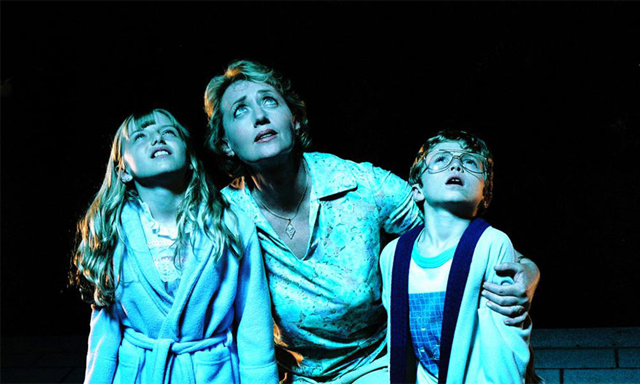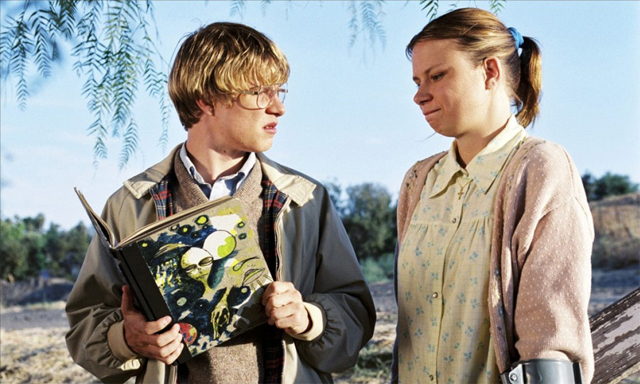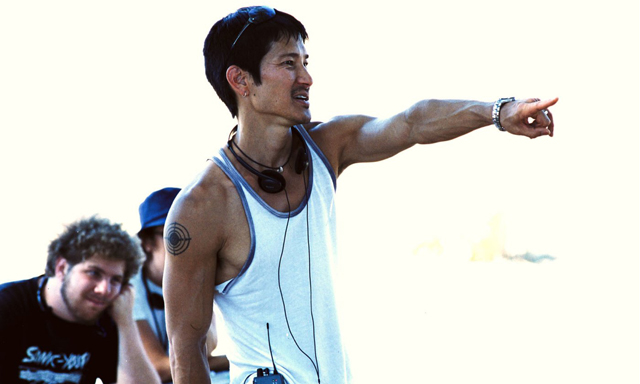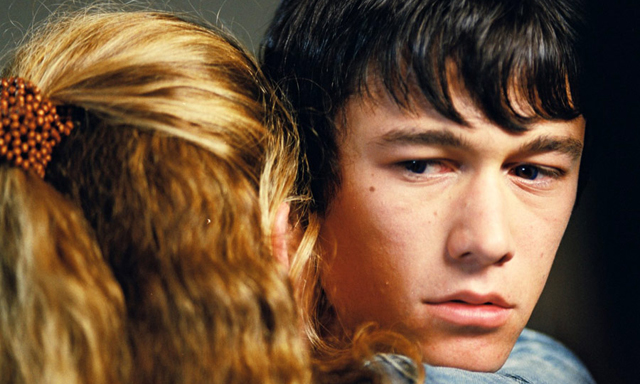Peter Machen speaks to American independent filmmaker Gregg Araki about Mysterious Skin, his remarkable new film about youth, paedophilia and the dreams and illusions from which we construct our personal narratives.
For more than 15 years American independent film maker Gregg Araki has been directing films that explore youth and sexuality with bravery and candour. And while he has had some degree of commercial success with films such as The Living End, Doom Generation and Nowhere, it is his latest film Mysterious Skin which has finally propelled Araki’s work into the mainstream of American consciousness.
Mysterious Skin is a film about the sexual abuse of children and the impact that the abuse has on their lives. It is a remarkable piece of cinema, in which truly terrible events are bathed in a pervasive sense of transcendent beauty. And it is in this beauty, this lyricism, this indelible sense of the poetic, that redemption, such as there is, is to be found.
Based on the novel by Scott Heim, the film tells the story of two boys, Neil and Brian, whose lives are connected by an incident that occurred one night when they were both eight years old. Ten years later, Neil is a beautiful rent boy who is attracted to the older men he picks up but is incapable of emotional intimacy with anyone. Brian is a frightened, insular mess who believes that he has been abducted by aliens. They live their lives in the small town middle-America of Kansas, held down by a web of lost subconscious connections.
The film cuts between their lives at eight and then eighteen, the impact of that night a defining element of who they have become, although neither of them is aware of it. Central to the film’s success is a set of extraordinary performances from Chase Ellison and George Webster as the young Neil and Brian, and from Joseph Gordon-Levitt (Third Rock from the Sun) and Brady Corbet (Thirteen) as teenagers who are gradually attempting to become adults. The film is so perfectly cast and acted that Scott Heim has said that when he sees the characters from his own book in his head they now look like those of Araki’s film – which is probably the greatest compliment that a film based on a book can earn. Gregg Araki has made a film about all of us, about the moments when they we uncover who we are and the things that have happened to us.
I spoke to him during the Durban International Film Festival which hosted the South African premiere of Mysterious Skin.
Peter Machen: In the years that you’ve been making films, the presence of gay people in the media has changed completely, having moved from a position of oppression to being virtually celebrated. Do you think this correlates with a greater acceptance in society as a whole for those who are sexually different, or is it all restricted to the televisions, magazines and the big metropolitan cities? I suppose I could rephrase the question by asking if you think that Bush-voting middle-America watches Will and Grace.
Greg Araki: I think that we’ve definitely come a long way in a short time. Obviously there is still a way to go, but the openness and tolerance in society is a lot different than it was even ten years ago. It’s very encouraging, especially amongst the younger generations. Young people today seem to have a “who cares” attitude about sexuality – you love who you love and are attracted to whoever you’re attracted to. They aren’t so stuck in the gay/straight/bisexual label game.

I’ve been floored by the across-the-board broad appeal Mysterious Skin has inspired – from both the press and audiences. It’s gotten the most widespread critical support of any of my films – People magazine, Ebert and Roeper, two- thumbs way up – it’s been truly amazing. I’ve had my usual Doom Generation/Nowhere kids come up to me at screenings telling me how much they love the film, but also grandmothers in their sixties, straight Mormon guys – it’s been kind of all over the map. I think the film really touches a universal chord in people, and despite some tough scenes and challenging subject matter, people really relate to the emotional journey the film takes you on.
PM: Round about the time of The Living End, you were represented as something of a spokesperson for New Queer Cinema, a movement which seemed to disappear off the media radar after about eighteen months. How did that feel at the time? Do you even think that you make queer cinema?
GA: I’ve always resisted being a spokesperson, in that I’m interested in cinema as an art form, not as a means of disseminating political propaganda. That said, I certainly respect the importance that a few of the ‘new queer cinema’ films have had culturally and creatively, and I’m very flattered to have The Living End included in that group.
PM: You’re a successful independent filmmaker who hasn’t sold out to Hollywood. Have you been approached to direct any big budget flicks? And do you think it’s possible that one of your films could crack the movie mainstream without having to compromise its truths?
GA: I’ve always said that I don’t really differentiate between studio and independent films. There are good and bad films made inside and outside the studio system. Budget doesn’t dictate quality at all really. That said, I understood from the start that a film as daring and uncompromising as Mysterious Skin needed to be made totally independently because I had no desire in making a watered down ‘TV movie’ version of the story.
PM: One of the reviewers of Mysterious Skin – I think it was Roger Ebert – said that unlike his friend Eric, Neil isn’t even recognisably gay. You’ve made a whole bunch of movies about people whose sexuality isn’t ‘recognisable’ because, I think, you make films about people and not sexualities. But at the same time sex is a central, almost centrifugal force in your films and your depictions are frank and honest, brutal and tender. Do you think if the media as a whole treated sex and sexuality honestly, that we’d all be a little less fucked up?
GA: God, I hope so. That’s what I find so moving and incredibly powerful about Mysterious Skin. It’s really so truthful and honest and complex, not just about sexuality but about how people interact and relate to one another. Its level of truth about human nature really knocked me out.
PM: To what extent did the two young actors who play Neil and Brian when they are eight know the context in which they were acting? Were their parents present on set? And have they even seen the finished film, since it’s definitely not a film for eight-year olds?
GA: I first read the book in 1995, but it took me several years to figure out a way to physically make it. It was imperative to me that the child actors playing eight-year old Brian and Neil be protected from the adult content and subject matter – but at the same time, those scenes with the young boys are crucial to the cumulative emotional power of the story. After experimenting with subjective camera and point-of-view in other projects, I was able to devise a strategy using point-of-view camera, careful editing, storyboards, etc, that could get me the shots I needed without the young boys having to know what the story was about.
Their parents, of course, had read the whole script and I discussed how the scenes would be shot in detail with them. So Chase and George (the young actors cast as young Neil and Brian) were able to perform their scenes emotional beat to emotional beat without really knowing the full story, or even what they were reacting to.
As for the finished film, both the young boys haven’t seen the film, but they understood when we were shooting it that it was for adults and that they’d have to wait till they were older. They have, however, both seen selected scenes that don’t relate to the more adult themes. Both the kids were absolutely amazing, and both sets of parents were wonderful to work with. We couldn’t have made the film without their trust and faith in us and in the project as a whole.

PM: While we’re on the subject, how do you feel about the whole concept of age restrictions?
GA: I believe that Mysterious Skin is intended for a sophisticated adult audience but I also think that there are many very sophisticated and smart 14-16 year olds, who could not only handle the film but would really get a lot out of it. Brady Corbet, for instance, who plays 18 year old Brian, was only 14 years old when we shot the film and is 16 now. He is smarter and has seen more art films than most 35-year olds I know.
PM: I’ve read that you are friends with Scott Heim, who wrote the book upon which you based your screenplay. Did you meet him after having read the book, or were you already friends at that point?
GA: I started corresponding with Scott via mail and email after I first read the novel in 1995, and we met in person for the first time in 2001 after I committed to adapting it. Scott loves the film and has been so supportive of it – he’s an angel. He’s been to almost all the festivals the film has played at – Toronto, Sundance, London, Tribeca, and he was out here a few weeks ago for the LA premiere. He’s really proud of the movie, which was a huge relief since we all felt a huge responsibility to do justice to the film.
PM: Scott has said that he likes the idea of having terrible things happen in serene suburban settings. And Mysterious Skin is an extremely beautifully account of an extremely dark subject matter. Do you ever feel that paradox too strongly? And do you think that people with paedophilic leanings might be titillated by the film. (I’m not a right wing fundamentalist, but I still think it’s an interesting question).
GA: That’s one of the main reasons I loved Scott’s novel so much. It’s such a dark, unsettling story, but so beautifully and poetically told. Its beauty is what makes it not only bearable but in the end, kind of transcendent. I wanted to translate Scott’s poetic language from book onto the screen, and make the film a beautiful aesthetic and cinematic experience – to create an all-enveloping dream world. So I worked very hard with my director of photography Steve Gainer, who also did Larry Clark’s Bully), and my production designer to create moody, atmospheric images from this ordinary and somewhat seedy milieu. I wanted the movie to be gorgeously poetic like a Wong Kar-wai or Terrence Malick film. But while I think the film’s images are seductive and almost make one swoon, the film’s point of view is very clear eyed and candid in depicting the irreversible damage that this abuse causes to these young boys. It changes their lives forever. That’s what makes the movie so heartbreaking, I think.
PM: In terms of sexual orientation, people are generally bundled into the categories of gay, straight or bisexual, but I think there billions of different sexualities. If someone asks you if you’re gay or straight, how do you respond? And do you think that this has any relevance to an interview?
GA: Not really. I just think of myself as a filmmaker and resist most attempts at labels and pigeon-holing since it all seems kind of ghettoizing and limiting to me. I just want to make movies that make people feel and think, and which have some kind of impact on their lives.


